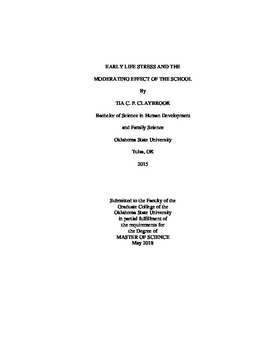| dc.contributor.advisor | Merten, Michael J. | |
| dc.contributor.author | Claybrook, Tia Crystal Paige | |
| dc.date.accessioned | 2019-03-29T15:39:53Z | |
| dc.date.available | 2019-03-29T15:39:53Z | |
| dc.date.issued | 2018-05-01 | |
| dc.identifier.uri | https://hdl.handle.net/11244/317802 | |
| dc.description.abstract | Antisocial behavior during adolescence can often lead to negative outcomes. These negative outcomes are more likely among youth who have been exposed to early life stressors (ELS), or potentially traumatic events. To combat negative outcomes, protective factors are crucial. While parental involvement and supportive relationships have been identified as protective factors, many ELS experienced by adolescents are in the context of their home environment making it critical to identify protective factors outside the home. The current study examines school protective factors (school connectedness and teacher-student relationship quality, TSRQ) as moderators for antisocial behavior and anger expression in youth who have been exposed to high levels of ELS. Results identified that majority of the seventh-grade adolescent population sample had been exposed to at least two ELS. ELS was a predictor for antisocial behavior and anger expression explaining 27% and 17% of the variance, respectively. Furthermore, the current study identifies TSRQ but not school connectedness as a moderator, or protective factor, for antisocial behavior exhibited by adolescents who have been exposed to ELS. These results suggest that supportive relationships within the school environment may be more important for prevention of antisocial behavior than feeling connected to the school environment itself. Anger expression was not moderated by TSRQ or school connectedness which could be explained by possible differences in emotion expression at school than at home. Future research is needed to examine qualities of supportive TSRQ and determine whether the school environment indirectly impacts outcomes in adolescents as a supportive school environment may impact the teaching quality of educators. | |
| dc.format | application/pdf | |
| dc.language | en_US | |
| dc.rights | Copyright is held by the author who has granted the Oklahoma State University Library the non-exclusive right to share this material in its institutional repository. Contact Digital Library Services at lib-dls@okstate.edu or 405-744-9161 for the permission policy on the use, reproduction or distribution of this material. | |
| dc.title | Early Life Stress and the Moderating Effect of the School | |
| dc.contributor.committeeMember | Bishop, Alex J. | |
| dc.contributor.committeeMember | Tate, Amy | |
| osu.filename | Claybrook_okstate_0664M_15710.pdf | |
| osu.accesstype | Open Access | |
| dc.description.department | Human Development and Family Sciences | |
| dc.type.genre | Thesis | |
| dc.type.material | text | |
